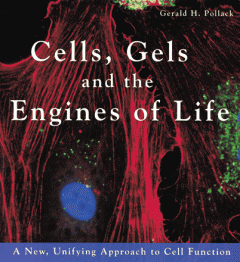
A revised vision of basic cell biology
Science fiction blends science and story, but stories and images are among the building blocks of science itself to a greater extent than most people realize. The most engaging science books tackle the narratives that scientists believe and on which they base study designs and interpretations. Cells, Gels, and the Engines of Life provides a detailed case study of how such scientific stories and simple mental images operate to guide entire fields over decades – and not always along the best available paths.
With everything from bio-engineering to bio-hazards of keen interest in the popular and science-fictional imaginations, it is important to be clear on the fundamentals of how cells work. We might have thought we already knew, but this book questions a whole list of “textbook” fundamentals and offers an alternative, integrated framework for explaining a wide range of cell functions.
Once a misguided view has been established in any field, not only in economics, but apparently also even fields such as cell biology with relatively few obvious sources of political distortion, it can take a rare blend of courage, expertise, and clarity to budge things in a new direction. This can emerge not only in the storied times of Copernicus, Kepler and Galileo, but even today. It still takes a heroic protagonist to put it all together and say it out loud against layers of convention. Meet Dr. Gerald H. Pollack, the author, professor of bioengineering at the University of Washington.
A master class in scientific thinking
Anyone with a firm reading ability can delve into this book and might be surprised, given the school-inflicted association of basic science instruction with soporific textbooks, to be sucked in on the first page. This is much more than a book about how cells work; it is a master class in fresh and precise scientific thinking, an art much in need of renaissance in an age of truth by click-through count, research-grant total, and mere widespread assertion.
[continue reading…]
Help Promote Prometheus Unbound by Sharing this Post
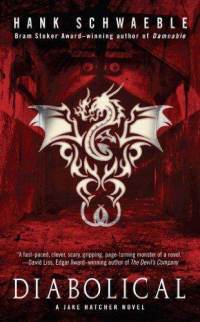
 Diabolical, by Hank Schwaeble, is a Jake Hatcher novel, the sequel to Damnable. It takes place a short time after the events of the first novel, but in a new location. Many of the same characters are back, with a few new ones, and the recipe for the story makes use of the same ingredients in just about the same proportions. How you felt about the first book is, within a reasonable margin, how you are going to feel about its sequel.
Diabolical, by Hank Schwaeble, is a Jake Hatcher novel, the sequel to Damnable. It takes place a short time after the events of the first novel, but in a new location. Many of the same characters are back, with a few new ones, and the recipe for the story makes use of the same ingredients in just about the same proportions. How you felt about the first book is, within a reasonable margin, how you are going to feel about its sequel.
Jake Hatcher has moved out to California to lie low for a while, working as a bouncer at a bar. Despite his precautions, he is found by people who want his services. He winds up entangled in a plot where nothing is as it seems, a demonic apocalypse is at stake, and no one can be trusted. Plot twists abound, as do action and fighting sequences, a little sex is sprinkled in, and the resolution is anyone’s guess right up until the end.
There are some areas in which Diabolical is an improvement on Damnable. Though the first novel had some inspired chapter hooks near the beginning, Diabolical saves its best twists for later on. For this reason, as well as a smoother flow that eliminates a little dead weight found in the first book, the second novel reaches its climax in better fashion than the first. In particular, Schwaeble does a good job of keeping the reader guessing about certain characters. Whereas in the first one there was a general blanket of uncertainty covering nearly everything, in the second the author takes you through highs and lows, at times fabricating a specious certainty that is ripped away, only to be brought back again. If the novel were a marionette, I would say the puppet master has grown more adept at pulling the strings.
[continue reading…]
Help Promote Prometheus Unbound by Sharing this Post
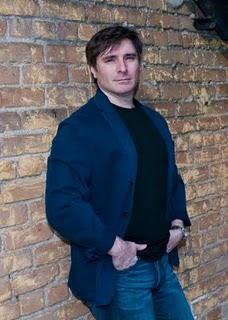
Hank Schwaeble
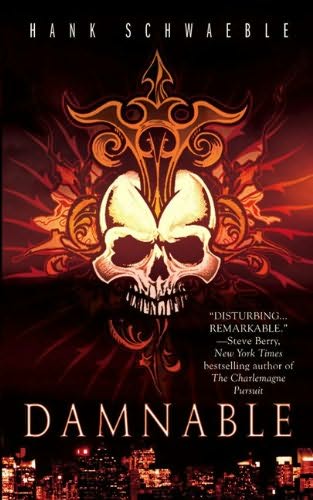 Damnable, by Hank Schwaeble, has been called noir, but anyone who has seen The Third Man, Double Indemnity and The Asphalt Jungle will see no more than a tenuous connection to what noir originally was. Just like the word libertarian often gets applied to anyone who is pro-choice on two or more issues, noir gets thrown at any tale with a dark atmosphere, a detective and/or so much as a single morally ambiguous character, resulting in an abundance of wrongly labeled people and stories. Damnable, winner of the 2009 Bram Stoker Award, is not noir any more than Bill Maher is a libertarian; it is a mix of detective tale, supernatural story full of demons and cultish rituals, and MMA-style fighting and action.
Damnable, by Hank Schwaeble, has been called noir, but anyone who has seen The Third Man, Double Indemnity and The Asphalt Jungle will see no more than a tenuous connection to what noir originally was. Just like the word libertarian often gets applied to anyone who is pro-choice on two or more issues, noir gets thrown at any tale with a dark atmosphere, a detective and/or so much as a single morally ambiguous character, resulting in an abundance of wrongly labeled people and stories. Damnable, winner of the 2009 Bram Stoker Award, is not noir any more than Bill Maher is a libertarian; it is a mix of detective tale, supernatural story full of demons and cultish rituals, and MMA-style fighting and action.
This is not to denigrate the work — or Bill Maher — but merely to put it in its proper category. As a story it is a modest success, not profound perhaps, but also without pretensions of depth and nuance. On the first page, a character muses, “Coffee was like pizza and sex — no matter how bad it was, it was usually still pretty good.” In other words, the author is decent enough to tell us straight away we will not be wrestling with complex ideas and weighty issues. When a zombie attacks a few paragraphs later, it is the author letting us know what we will be doing.
I enjoyed my time with the novel, which I believe is all the author ever wanted for his readers. I know I enjoyed it because I put my book mark in the sequel as soon as the last page was turned. The main character, Jake Hatcher, is something more than one dimensional, interesting from the outset. His situation is intriguing, his history morally ambiguous, and his abilities perfect for the action to follow.
We first meet Jake as a convict in a military prison. One of his jailors has it out for him, and Jake suspects his cellmate has been recruited to pick a fight with him, to get him in trouble so his term can be lengthened. There is also another trap his jailor has set for him, and while he tries to navigate these he gets a call from his mother telling him his brother has died, an event we saw in the prologue.
[continue reading…]
Help Promote Prometheus Unbound by Sharing this Post

In a recent addition to the Libertarian Tradition podcast series, part of the Mises Institute’s online media library, Jeff Riggenbach uses Objectivist Robert Bidinotto’s novel Hunter as a launchpad to discuss Objectivist subculture and fear.
You can also read the transcript below:
In a recent conversation with a younger libertarian, I heard something that I found somewhat surprising and somewhat disturbing at the same time. But later, on reflection, I realized that what I had heard should not have surprised me, however much it may still disturb me. My young friend had said, and I paraphrase here, that he was surprised to learn that I thought of Objectivists as libertarians at all. Based on what he had seen of the positions they took on political issues, especially foreign policy, he had concluded that they were just another kind of neocon.
I refer to this younger libertarian as “my young friend,” but the fact is, he’s no kid; he’s in his early 40s, which tells you how long the situation with respect to Objectivism that I’m going to describe and deplore has been going on — that a man in his 40s cannot remember a time when leading Objectivists didn’t talk in such a way about questions of US foreign policy (and about other questions as well, as we shall see) that they become hard to differentiate from certain kinds of conservatives and hard to see as any sort of libertarian.
But before I get further into that depressing theme, there’s a new book I’d like to commend to your attention. It’s a novel entitled Hunter: A Thriller, and it’s the work of the prominent Objectivist writer Robert Bidinotto. Now, a word of caution. What follows is not properly a book review, because what I’m really interested in talking about here is not Bidinotto’s thriller in its capacity as a novel, an entertainment, a work of “popular art,” but rather what it can tell us in its capacity as a cultural artifact.
[continue reading…]
Help Promote Prometheus Unbound by Sharing this Post

Ted Lacksonen

The Eagle Has Crashed is the provocative title of Ted Lacksonen’s first novel. Known as The Country Thinker on the Internet, Mr. Lacksonen has written a tale of what may be in store for this country if we don’t sober up and start walking the straight and narrow. His main concern is our mounting debt and how that could destroy our financial future and, through a chain reaction, tear our nation apart.
The near-future story follows the fortunes of many different people as a time of tribulations begins. Though a few high ranking officials do play a role, including the President of the United States, most of the characters are ordinary citizens in central Ohio, where Mr. Lacksonen lives. When the economy begins to crack, a series of mishaps, tragedies and catastrophes like a crescendo of disaster wracks the country. People become desperate and respond according to their nature, some digging in to take care of themselves, others making sacrifices for what they see as the good of the country.
Though I have some sympathy for it, I am not fully in agreement with the message of the book. I do not believe debt would be the prime driver of an economic collapse. Rather than close the deficit and pay down the debt, I would prefer to see government spending come down. I would even look favorably on, or at least view as an improvement, a budget deal that increased the deficit if it also cut revenues — that Washington euphemism for stolen money — and spending (a real cut, not the fake cuts we have been hearing about). Nevertheless, I do not argue that debt is trivial or innocuous, and it is nice to see an author use it as a backdrop for his tale.
[continue reading…]
Help Promote Prometheus Unbound by Sharing this Post
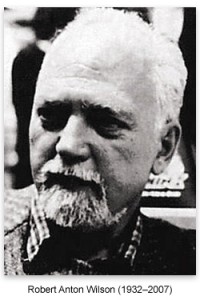
In a recent addition to the Libertarian Tradition podcast series, part of the Mises Institute’s online media library, Jeff Riggenbach discusses the life of Robert Anton Wilson (1932–2007), author of the Illuminatus! trilogy.
You can also read the transcript below:
Robert Anton Wilson was born January 18, 1932 in Brooklyn. He grew up in the section of Brooklyn known as Flatbush and, later, after his father lost his job on the waterfront, in a much poorer section of Brooklyn known as Gerritsen Beach. “Rents were very low” in Gerritsen Beach, Wilson recalled in his book Down to Earth, the largely autobiographical second volume of his Cosmic Trigger Trilogy, “because only the poor Irish Catholics lived there.” At another point in the same account, he refers to his old neighborhood as “an Irish Catholic ghetto.” Not that all Irish Catholics were poor, mind you. “My father had relatives in Brooklyn Heights,” Wilson wrote in 1991,
[continue reading…]
Help Promote Prometheus Unbound by Sharing this Post

William S. Kerr
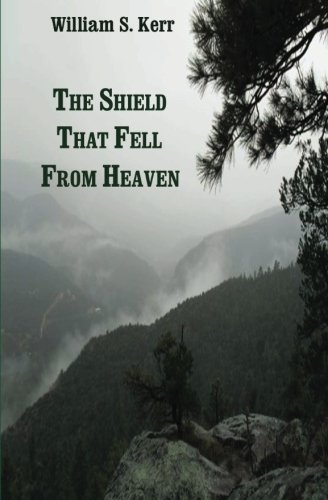 William S. Kerr’s first novel, The Shield that Fell from Heaven, is a delightful surprise. It is not a book I would have expected to find from such a small publisher, Groton Jemez Publishing, and it is not a book I would have expected to find in this century. Indeed, had I been told it was written in the 19th, I would have believed it, at least until I came to a more modern science fiction element.
William S. Kerr’s first novel, The Shield that Fell from Heaven, is a delightful surprise. It is not a book I would have expected to find from such a small publisher, Groton Jemez Publishing, and it is not a book I would have expected to find in this century. Indeed, had I been told it was written in the 19th, I would have believed it, at least until I came to a more modern science fiction element.
It is written as the journal of a Frenchman who, in 1861, on the eve of our War for Southern Independence, comes to America as a war correspondent. Edouard de Grimouville is a minor noble whose House has lost most of its fortune. In the neutral state of Kentucky he finds political opinions of all stripes, a woman to fall in love with, and more adventure — and of an unforeseeable sort — than he was looking for.
Kerr writes with the prose of a bygone era, and does so convincingly, like a foreigner who has mastered a native accent. As a lover of that more sensuous, patient style, I was quite happy to immerse myself in it and would have gotten some enjoyment from the experience even if that had been the only appetizing aspect of the novel. There is, of course, much more to enjoy.
[continue reading…]
Help Promote Prometheus Unbound by Sharing this Post


















